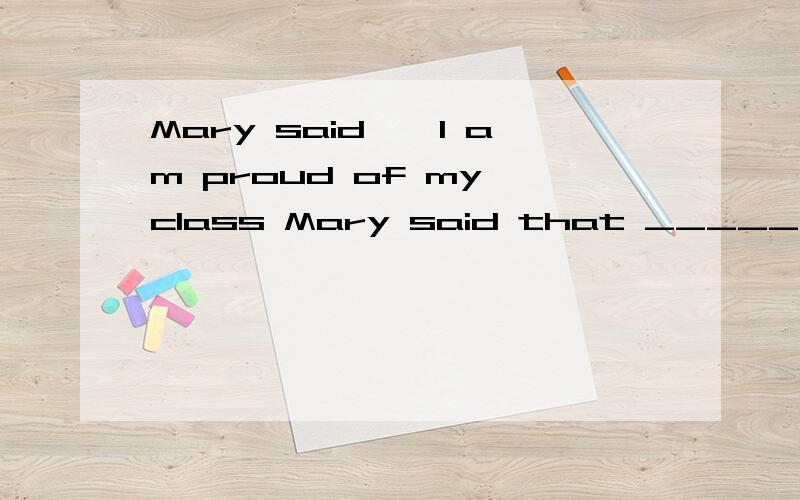Mary said,"I am proud of my class Mary said that ______ _______ proud of her classBill said,''I am going to have a piano lesson tonightBill said he ______ _______ _______have a piano lesson _____ ______Dave said,''I can sing English songs,''Dave said
来源:学生作业帮助网 编辑:作业帮 时间:2024/04/28 12:21:28

Mary said,"I am proud of my class Mary said that ______ _______ proud of her classBill said,''I am going to have a piano lesson tonightBill said he ______ _______ _______have a piano lesson _____ ______Dave said,''I can sing English songs,''Dave said
Mary said,"I am proud of my class Mary said that ______ _______ proud of her class
Bill said,''I am going to have a piano lesson tonight
Bill said he ______ _______ _______have a piano lesson _____ ______
Dave said,''I can sing English songs,''
Dave said ______ _______ ______ Englisk songs
The woman teacher asked the students,''Can you understand what I am saying?''
The woman teacher asked the students _______ _______ could understand what she was saying
The teacher said to her student,''Please give me the book
The teacher told her student ________ give ________the book
Mary said,"I am proud of my class Mary said that ______ _______ proud of her classBill said,''I am going to have a piano lesson tonightBill said he ______ _______ _______have a piano lesson _____ ______Dave said,''I can sing English songs,''Dave said
Mary said,"I am proud of my class.
Mary said that (she was ) proud of her class.
Bill said,''I am going to have a piano lesson tonight
Bill said he (was going to) have a piano lesson (that night).
Dave said,''I can sing English songs,''
Dave said (he could sing) Englisk songs.
The woman teacher asked the students,''Can you understand what I am saying?''
The woman teacher asked the students (if they) could understand what she was saying.
The teacher said to her student,''Please give me the book".
The teacher told her student (to) give (her) the book.
直接引语转为间接引语
1.Mary said,"I am proud of my class.''
Mary said that she was proud of her class.
2.Bill said,''I am going to have a piano lesson tonight.''
Bill said he was going to ...
全部展开
直接引语转为间接引语
1.Mary said,"I am proud of my class.''
Mary said that she was proud of her class.
2.Bill said,''I am going to have a piano lesson tonight.''
Bill said he was going to have a piano lesson that night.
3.Dave said,''I can sing English songs.''
Dave said he could sing English songs.
4.The woman teacher asked the students,''Can you understand what I am saying?''
The woman teacher asked the students whether(if) they could understand what she was saying.
5.The teacher said to her student,''Please give me the book.''
The teacher told her student to give her the book.
当主句为一般过去时时,直接引语转为间接引语,改变人称、时态:一随主,二随宾,第三人称不更新。
一般现在时→一般过去时
一般过去时→过去完成时
一般将来时→过去将来时
现在完成时→过去完成时
过去完成时→过去完成时(不变)
can→could
may→might
时间也可以改:tonight→that night
指示代词this变that,these变those
可以将表示地点的here改为there(视情况而定)
若从句说的是一个基本事实(真理),则不变。如:
He said,''light travels faster than sound.''他说:“光比声音传播速度快。”
→He said that light travels faster than sound.他说光比声音传播速度快。
若为一般疑问句,要用whether或if引导。谓动为said时,改为asked,可加上一个间接宾语。
He said,''are you good at math?''
→He asked (me) if I was good at math.
祈使句变为to的不定式。
Close the window.''he said to me.
→He told me to close the window.
若为特殊疑问句,仍用原来的疑问词引导。
''What can I do for you?''he asked me.
→He asked me what he could do for me.
收起